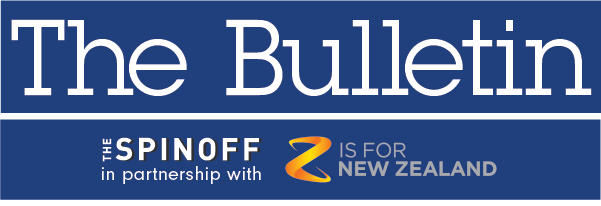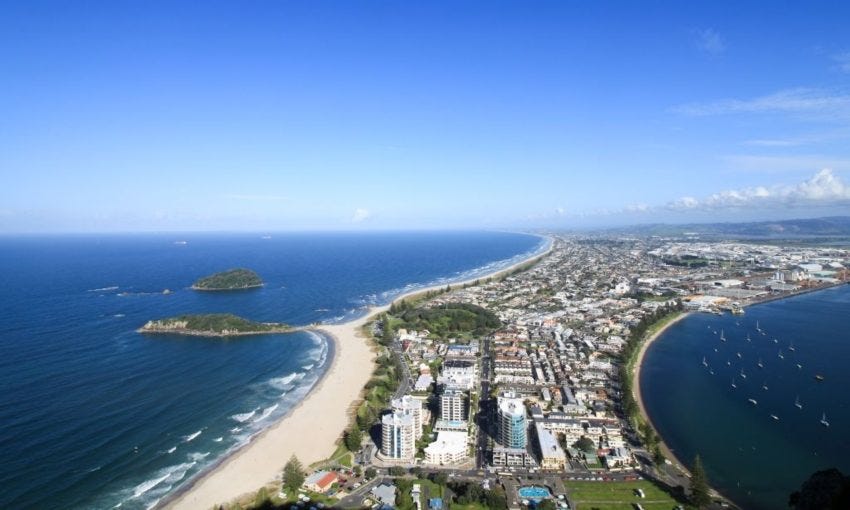Tauranga rates and why painful proposed rise is needed
The new mayor says councillors have been cowardly for too long

Good morning and welcome to The Bulletin for Friday 6 March, by Alex Braae for The Spinoff. Presented in partnership with Z Energy.
In today’s edition: Tauranga passes draft budget featuring massive rates rise, JLR makes further donation allegations, and more Covid-19 cases confirmed.

(Getty Images)
We'll start with a regional story today, because this is one that has implications for plenty of other places. Local body politics in Tauranga is getting absolutely steamed up over a big rates rise in the draft budget. A large amount of the proposed increase is going to go towards water and transport infrastructure, along with simply keeping things ticking over, as the city struggles to cope with growth. The BOP Times' (paywalled) Samantha Motion was there to see the debate play out around the council table, and it was clearly a fraught discussion. A particular concern expressed by one councillor was that a big residential rates rise for people on low incomes in expensive houses would be particularly bad for Tauranga – a city with plenty of retirees.
Mayor Tenby Powell adopted a strongly pro-growth position in arguing for the rates rise, saying in quite a memorable line, "this is Tauranga, not a fortified, walled city of ancient Europe... It's 2020, not 1620." Further comment was provided in this Sun Live story, in which he slated previous city leaders for a lack of courage leading to an infrastructure deficit today. And it's fair to say these issues have been talked about for a while – here's a 2018 story from Interest which notes Tauranga has been up against a debt to revenue limit, making rates rises the only realistic way to get enough revenue to then borrow for investments.
As this recent press conference from the mayor and deputy mayor outlined, the city's financial situation is now pretty dire. He argued that "rapid and sustained growth" means that the way local government has funded itself isn't tenable any more. With an extremely tight housing market, that infrastructure is desperately needed to build more. In my view, it will be a really interesting test case for all of local government on how to get tough but probably necessary decisions through – Tauranga's issues are acute, but not unique. There are plenty of other Councils facing struggles to pay for their growth, but making an acceptable case to voters for that has always been a challenge.
Just quickly, a message from a reader:
“The Spinoff focuses on quality journalism – not just the topic of the day, but societal issues and contextual analysis of media.” Cathryn Bridges, Spinoff Member.
Support our work. Join The Spinoff Members.
Under parliamentary privilege, renegade MP Jami-Lee Ross has accused National of receiving "large amounts of foreign donations" that link back to the Chinese communist party. Radio NZ reports that he named two individuals as being "conduits" for the donations, and said he doubted that National knew of the source at the time, but should now give them back. But in a statement, a party spokesperson said they had no idea what donation was being referenced. They also said they had not seen a document that Ross attempted to table in parliament, which were allegedly two flow charts prepared by the SFO, showing how money flowed to the party. The tabling was blocked on the grounds that the matter is currently before the courts.
A third case of Covid-19 coronavirus has been confirmed, and as Toby Manhire reports, the method of transmission suggests that another case is highly likely. It is classified as a “family transmission”, and the man is in self-isolation at home, as he does not require hospital-level care. The ministry of health says that those that have been confirmed are "individual, sporadic cases. We want to find those cases. It’s good we’re finding them.” In addition to that, the NZ Herald reports that one person who had already been confirmed as having the virus has come forward and said their husband has also tested positive – that one is likely to be confirmed by health officials today.
Meanwhile, a recent poll has found that a plurality (but not the majority) of the country are satisfied with how the government is handling the issue. It's worth sharing this piece from Stuff, which outlines what measures have been taken, particularly around the health response and economic response. And One News reports that keyboard warriors are harming the fight against the virus, by attacking the victims of it and their families online. The fear from health officials is that such idiocy will dissuade others who might need testing from coming forward and getting help. Finally for this topic, this is an excellent piece by former pandemic planner Richard Simpson, who has spent many years thinking deeply about how to keep people safe in exactly these situations.
You've probably missed the news that an obscure Auckland Council staff unit is being disbanded. But the reverberations of the Auckland Design Office being shut down are getting much louder, in part because (as the perception goes) they were a progressive and successful unit forging a new path through the bureaucratic fog. The NZ Herald's (paywalled) Simon Wilson is particularly angry about it all, and has jointly put the blame on Council executives for pushing valuable people out of jobs, and mayor Phil Goff and his councillors for letting it happen.
A man who is a member of a white nationalist group was allegedly behind threats towards Christchurch's Al-Noor mosque. 19 year old Sam Brittendon appeared in court yesterday, reports Newsroom's Marc Daalder. Brittendon is a member of Action Zealandia, who have been in the news a bit recently. His father spoke to Stuff's Sam Sherwood and Thomas Manch, and said while he would support his son, he was "extremely disappointed," and he wasn't raised to have such views.
The drought is pretty bad in a lot of places, but it's particularly severe around the lower East Coast of the North Island. Stuff's Marty Sharpe reports unauthorised tankers have been collecting water from hydrants in Dannevirke and Woodville, prompting complaints from residents who are desperately conserving water. And just a bit to the south, the Wairarapa Times-Age reports that their region has just come out of their third-driest February on record, with an average but potentially inconsistent amount of rainfall predicted for autumn. The last line of their story, written at the start of the month, is a stark illustration of the country's extreme weather – "twenty-four locations around the country are tracking for a record or near record dry February, while six locations are heading for their wettest February ever."
An important story about an important workforce: Radio NZ's John Gerritsen reports that the number of teachers working past retirement age has increased significantly in the past decade. It's not necessarily a bad thing – there are still significant teacher shortages and some of the older teachers are sticking around because they're really good at the job. But it's also potentially a sign that teacher salaries don't allow people to save enough for a comfortable retirement, so they need to keep working later in life.
Got some feedback about The Bulletin, or anything in the news?
Drop us a line at thebulletin@thespinoff.co.nz

Right now on The Spinoff: Laura O’Connell Rapira writes about what needs to be done with a report showing racial bias in police work. The latest Gone By Lunchtime looks at the political dimension of Covid-19. Jihee Junn explores the history of investing in New Zealand, and in particular how we came to be obsessed with housing. Alice Webb-Liddall looks into the increasing phenomenon of kids trying to become Youtube stars. Alice Neville meets a remarkable entrepreneur who has made food rescue profitable – in one case she managed to save 27 tonnes of tuna from being dumped.
And there's a brand new edition of The Side Eye by Toby Morris to read. It's about dental care, and how the nature of how it is funded means that those on lower incomes routinely miss out on treatment.
Look, I know we had a bit about this yesterday, but I'm quite steamed up about it so you'll just have to put up with a bit more. For a feature today, a thoughtful piece from The Monthly in Australia about what the closure of news wire AAP will mean for public trust in authorities and government accountability. The sort of reporting they do is an under-valued public good, and I reckon there will be a lot of negative consequences from the loss of AAP – not that we'll necessarily hear about them. Here's an excerpt:
Government MPs in parliament yesterday expressed their condolences for the job losses, but given their track record regarding public-interest journalism, we should be sceptical about their platitudes. They have so far done nothing to prevent or mitigate the hollowing out of the serious news media in recent years. In some cases, they have made it worse.
For instance, as a result of the Coalition’s assault on the ABC starting in 2014, the national broadcaster will have to get by with $106 million of budget cuts per year until 2022. The extra cost of its 935 emergency broadcasts this financial year (compared to 371 the year before) will just have to be absorbed.
I don't want to jump the gun on this too early, but it could be a shocker of a Warriors season, starting next weekend. They've been pretty poor in the pre-season, not winning any games, and have a long list of injuries already starting to pile up. Newshub reports that the team isn't too concerned yet – after all, last year they had a wonderful pre-season and then bombed when it mattered. But still, maybe if you're an Auckland code fan it would be a good idea to just stick with the Blues this year?
That's it for The Bulletin. If you want to support the work we do at The Spinoff, please check out our membership programme.




